The annual luncheon for Masters and their Clerks was held at Brewers’ Hall.
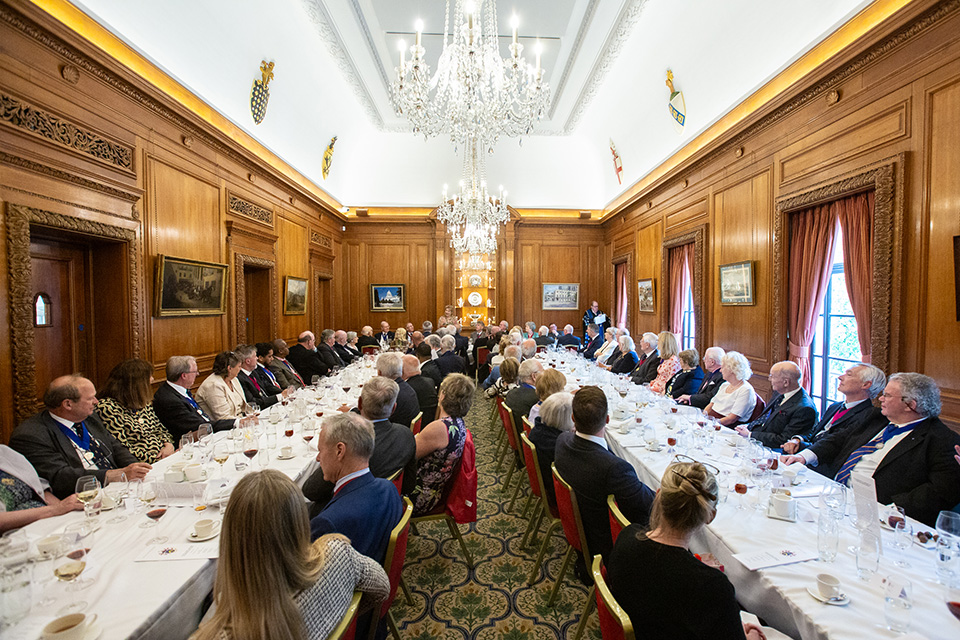
The home of the Brewers’ Company has stood on the same site since 1403 and has been let to other livery companies since 1422. The first two halls were destroyed respectively by the Great Fire in 1666 and the Blitz in 1941. The current building, designed by Sir Charles Wheeler PRA, opened in 1960 but closed in 2015 for a major refurbishment. Reopening in 2022, it included a stunning new gallery reception area. We were honoured by the presence of the following Masters and Clerks:
- Poulters - Mark Goodwin and his Clerk: John Grant
- Joiners and Ceilers – John Garbutt KFO and his Clerk: Tanyia Ingham
- Glaziers – Clive Osborne
- Paviors – Melanie Hampton and her Clerk: Jennifer Athill
- Builders’ Merchants – Alan Hawkins and his Clerk: Lady Jane Hillard
- LIghtmongers – Peter McVeigh and his Clerk: Lt Col Mark Houghton
- Masons – Clerk: Major Giles Clapp
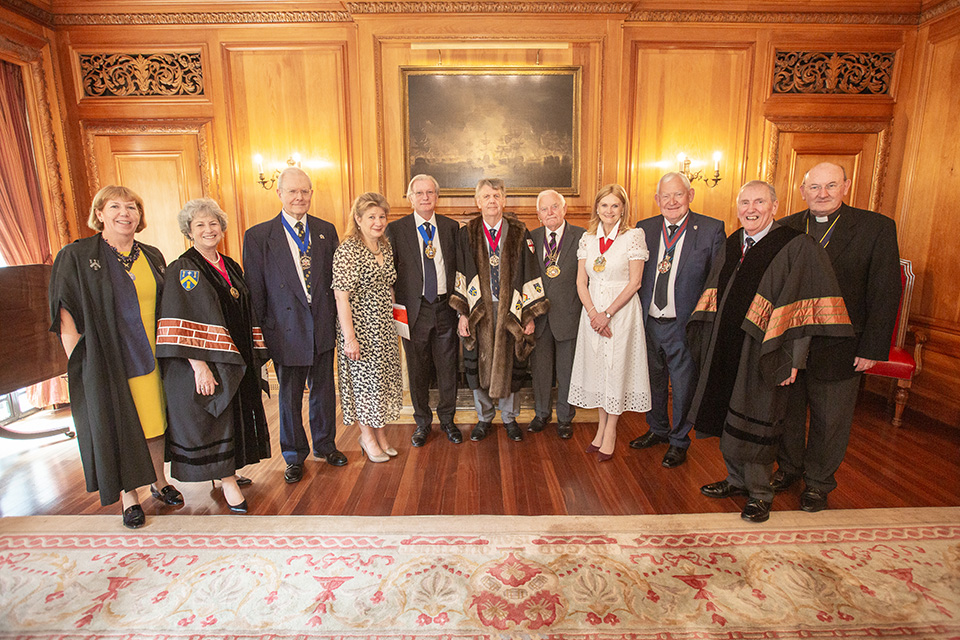
After an enjoyable Champagne Reception, the Master, Wardens and our principal guest, Professor Clare Jackson, together with the Clerk, the Honorary Chaplain and the visiting Masters processed into the hall. As the day marked the 80th Anniversary of D Day, the Honorary Chaplain composed a grace to mark the occasion as follows:
‘Gracious God, as on this 80th Anniversary of D Day, we recall the heroism and dedication of those who answered the call of duty to liberate the world from tyranny; so may we who gather in freedom and fellowship, dedicate ourselves and this Worshipful Company of Tylers and Bricklayers to the highest ideals of service and philanthropy. We offer thanks for the privilege of eating together and ask for a blessing upon us, root and branch, that our flourishing may be worthy of our heritage, for in God is all our trust. Amen’
Some 80 of us then sat down to a delicious lunch. The menu consisted of Dorset crab accompanied by a South African Sauvignon Blanc from Elgin, followed by Herdwick lamb from Cumbria. With the lamb an Australian Pinot Noir, Sidewood 2019, was served. We continued with a raspberry tart, tea and coffee. Guests were also offered a delicious No 21 Fine Madeira.
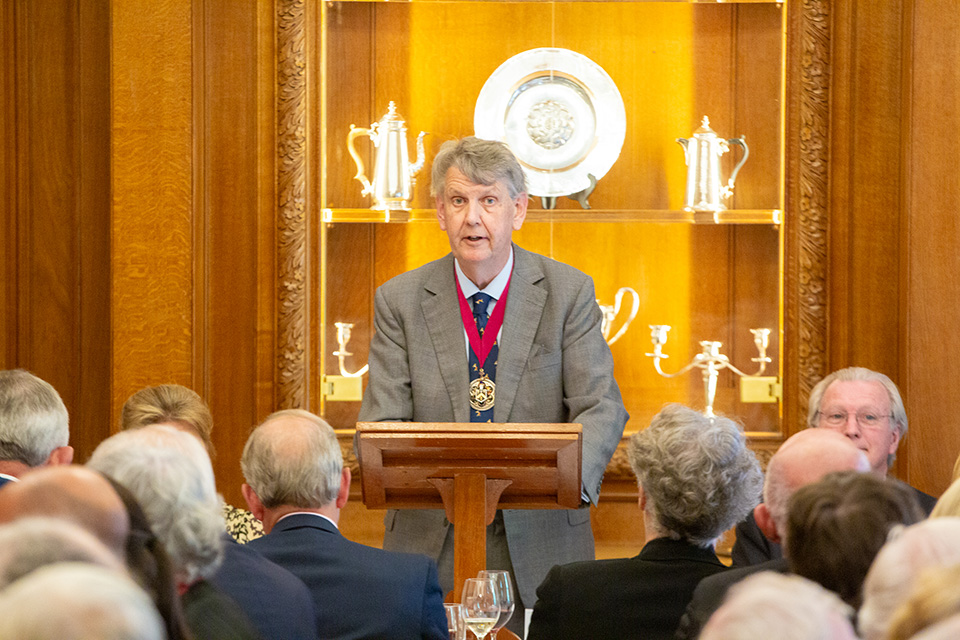
Following the toasts, the Master introduced each of the distinguished guests - the six Masters and the six Clerks - saying how delighted he was to offer them hospitality and entertain them.
He went on to explain that his choice of Brewers’ Hall was influenced by the Mistress – her father was a liveryman of the Brewers’, being at the time a director of a brewing firm known as Courage Barclay & Simonds. He was in fact the first director of the company who wasn’t a Courage, a Barclay or a Simonds, the other directors being known as Major Peter, Mr Tim and so on. After an extensive and illustrious career in West Africa, Burma, India and Sudan he had returned home with a wife and a daughter and decided that however depressed the world became, there would always be a demand for beer. One day he was lunching with the other directors in their brewery near Tower Bridge and commented that the beer they drank at lunchtime, which was brewed in small quantities in Alton in the Director’s Dining Room, would be very popular if they put some investment into marketing it. The company decided to roll it out nationally and so we were given the ale we now know as ‘Courage Directors’.
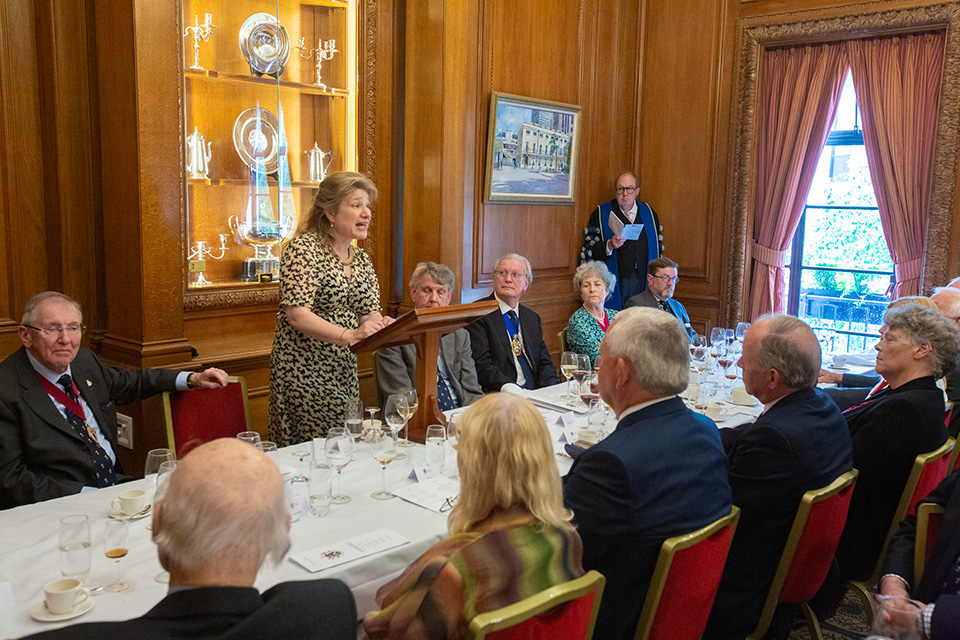
The Master warmly introduced the principal guest, Professor Clare Jackson who he described as: “a distinguished Cambridge historian who specialises in early modern history, particularly the 17th century in England and Scotland. She is an honorary professor at the University of Cambridge and for ten years was Senior Tutor at my old college, Trinity Hall, where she is a Fellow in History. Clare appears frequently on TV and radio and presented two series for BBC2 on The Stuarts and The Stuarts in Exile.”
Professor Jackson spoke briefly about some of her research and especially about her book, Devil-Land: England under Siege 1588-1688 which was published in 2021. “One motivation for writing Devil-Land was to think again about the stories that, as a nation we tell ourselves. Those 100 years – from the defeat of the Spanish Armada in 1588 to the so-called ‘Glorious Revolution’ in 1688 – are often simply presented as a progressive, secure march towards political stability, religious toleration, economic prosperity and a global empire. By contrast, Devil-Land emphasises Stuart England’s insecurity, instability and vulnerability. One of the book’s more provocative statements was that ‘to contemporaries and foreigners alike, 17th century England was a failed state: a discomfiting byword for seditious rebellion, religious extremism and regime change’. It was the most unstable, turbulent century in our nation’s history: one in which a bewildering number of radical events took place, often at roller-coaster speed, leaving contemporaries dazed and anxious. In 1603, for example, Henri IV of France’s envoy complained that ‘no nation in Europe is more haughty and disdainful, nor more conceited, in an opinion of its own superior excellence’. In the 1630s a Venetian envoy railed to his Spanish counterpart that ‘there was no school in the world where one could learn how to negotiate with the English’ and in 1680 a despairing French ambassador warned Louis XIV that ‘what I write will appear to your Majesty without doubt very extraordinary, but England has no resemblance to other countries.’ ”
In ending, Professor Jackson described a chapter in her upcoming book on King James VI & I “…about James’s physical health that includes a description of a banquet that he attended in May 1607, hosted by the Merchant Taylors’ Guild for which Ben Jonson wrote some new celebratory songs as entertainment. For eloquence, I’m afraid I can’t rival Ben Jonson – erstwhile Freeman of this Company – and I will leave it to others to compare today’s wonderful lunch with the fare provided for the royal party 400 years ago. On that occasion the assembled company enjoyed ‘224 tongues from various unfortunate animals; 59 pikes; 17 swans; 417 chickens; 10 owls; 1,300 eggs; 360 pounds of butter; 446 pounds of sugar; 14 gallons of cream; 28 barrels and a tun of beer and ale; about 441 gallons of wine; 24 pounds of prunes; 20 pounds of currants; 3 gallons of gooseberries; 60 pounds of potatoes; 120 artichokes and 14 pickled lemons.’ “
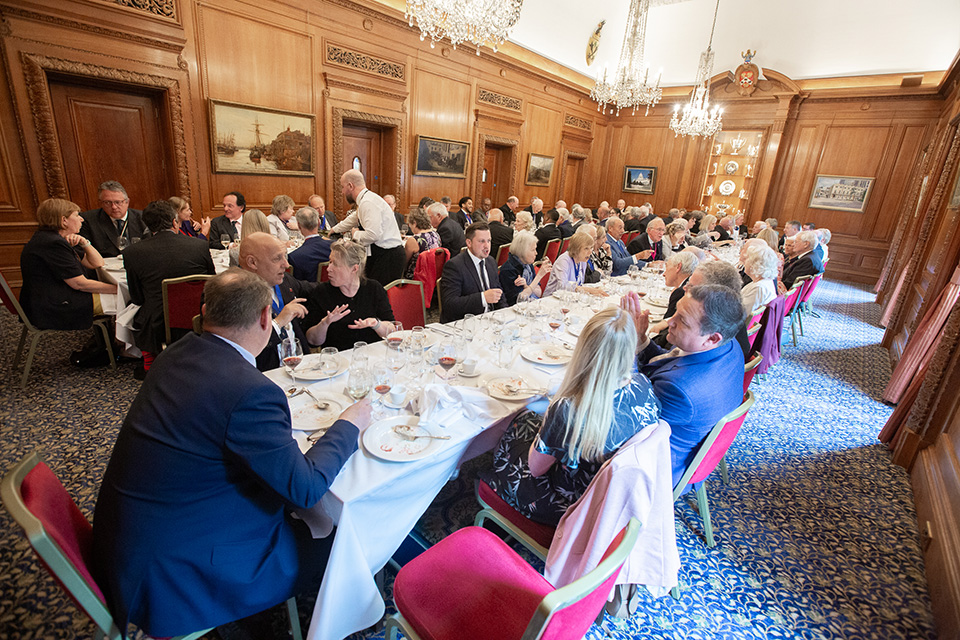
The Master duly thanked Professor Jackson for her entertaining and incident filled address and fully understood why people study history and still buy history books and historical novels in large quantities.
This concluded a most enjoyable and memorable luncheon.
Ian Grimshaw Past Master
